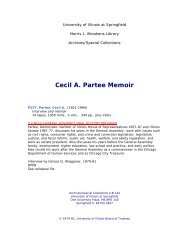harold a. katz memoir volume 1 - University of Illinois Springfield
harold a. katz memoir volume 1 - University of Illinois Springfield
harold a. katz memoir volume 1 - University of Illinois Springfield
You also want an ePaper? Increase the reach of your titles
YUMPU automatically turns print PDFs into web optimized ePapers that Google loves.
A: Oh yes, these were battered frame houses. If anybody were surveying it for the Twentieth<br />
Century Fund, they would have concluded that this was life at the poverty<br />
level. Fortunately, we never viewed it that way.<br />
The way the blacks were treated used to bother me. They were in the neighborhood, and<br />
if they kept their place, they could be treated in a friendly way. When we went to the local<br />
theater downtown, the blacks sat in the upper balcony. White Nashville would sit either<br />
on the main level or in the first balcony. But in the far upper balcony, there was a separate<br />
place where only the blacks would sit. And if we got on a bus, well, the blacks had to go<br />
to the back <strong>of</strong> the bus. I played with blacks in the neighborhood. But if you went to the<br />
theater together, they had to go up to the upper gallery, or if we got on a bus, they had<br />
to go to the back <strong>of</strong> the bus. You just couldn't be together. And there were drinking foun-<br />
tains - the blacks would have their drinking fountains in public places, and the whites<br />
would have theirs. It is just unbelievable that things were like that in Nashville, but they<br />
were. There was some kindliness between whites and blacks, as long as blacks did what<br />
they were supposed to do. Let them get out <strong>of</strong> line, and they would be treated brutally. My<br />
parents were not typical <strong>of</strong> the community. But, in any event, that's the way life was.<br />
Q: Did any <strong>of</strong> the blacks work at the store?<br />
A: No, we had no outsiders working in the store. It was a small store. And that's why I<br />
would not want you to get any exaggerated ideas <strong>of</strong> my father as being part <strong>of</strong> the mercantile<br />
class, Nothing like that. It was a very meager existence. The Depression was a disaster<br />
even to that meager existence. It was a Ma and Pa Store. They would stay open long hours<br />
and in some way manage to get enough money so that they could provide sustenance for<br />
the family.<br />
Q: Let's see, how many brothers and sisters?<br />
A: I had one <strong>of</strong> each and I was the youngest <strong>of</strong> three. I have a brother who is about five<br />
and a half years older than I, and a sister about three and a half years older than I.<br />
Q: What's your brother's name?<br />
A: Sam. He left Nashville in the Depression. Sam was intellectually motivated, what you<br />
would now call college material. But there wasn't enough money to send him to college,<br />
so he went to Washington to take a job as a junior messenger with the Veterans<br />
Administration, His pay was six hundred dollars a year.<br />
He went to school at night in Washington and gradually picked up his formal education. He<br />
became a government person and moved into pr<strong>of</strong>essional areas. He was an advisor at the<br />
Federal Reserve Board, and then he became editor <strong>of</strong> an International Monetary Fund<br />
publication. Now he's on the faculty <strong>of</strong> Georgetown <strong>University</strong>. At that time, in the Depres-<br />
sion years, there just wasn't money to send a child to college. By the time I came along<br />
the Depression had eased just a little.<br />
Q: It had?<br />
A: Not very much, but a little. When I entered Vanderbilt in 1939, the tuition was two<br />
hundred and seventy-five dollars for a year. My parents did not have that much<br />
money. And I remember that the university agreed to take three postdated checks from<br />
my father so that he could write out a $100 check and date it two months ahead, and write<br />
out another for $100 and date it four months ahead, and then a third one for $75 and date<br />
it six months ahead. By the time each check became due, he and my mother - she tried<br />
to keep the store going after he went to work for the Metropolitan - would try to scrape<br />
up enough money so that each check would clear.

















